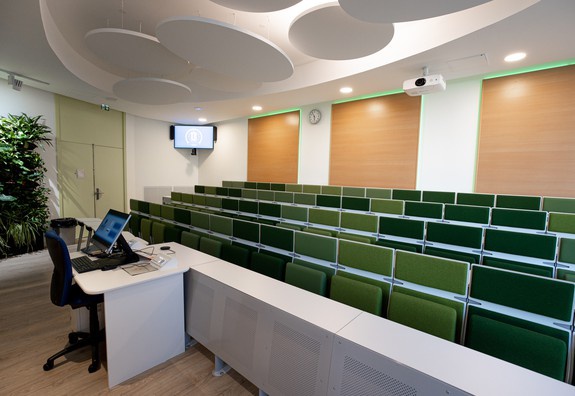ESSEC launches new ecological and social transition program: The MSc in Sustainability Transformation
4.10.2021

In the spring of 2020, ESSEC Business School launched an ambitious ecological and social transition initiative: Together. This strategic plan was designed to help the School fulfil its mission of training future leaders capable of responding to major social and environmental challenges. As part of this initiative, the School incorporated mandatory courses on ecological and social transitions into all its existing programs, and has begun the transformation of its campuses in order to reduce their environmental impact. In 2021, ESSEC will go even further with the launch of a new MSc in Sustainability Transformation. The program will admit the first intake of students at the end of August 2022.
The MSc in Sustainability Transformation is designed to equip future managers with the knowledge, know-how and network they need to have a sustainable impact on their companies and organizations, to become agents of change in an increasingly volatile world and to seize new opportunities from sustainability development.
The recent events that have shaken our societies, coupled with the challenges of global warming, have reaffirmed the pressing need for us to redefine not only our priorities, our economic models and our organizations, but also our societies themselves and our individual behaviors.
Sustainability is no longer just an option, it is imperative. This much-needed transformation must permeate all aspects of organizations in order for meaningful change to occur. These goals can only be achieved with the emergence of new talent capable of bridging the gap between business,social and environmental concerns.
By offering a balance of academic and professional experiences, the MSc in Sustainability Transformation will provide students with a holistic education that combines knowledge in management and keen understanding of current social and environmental issues. The program is built on close ties with the world of business, public stakeholders and non-governmental organizations (NGOs) through tailored case studies, “learning expeditions”, as well as an internship or thesis. Thanks to this approach, students will be immersed in real-world scenarios, enabling them to apply the knowledge and skills they acquire throughout the program.
The MSc in Sustainability Transformation is taught in English, and students can also choose from one of the following six specializations:
-
Circular Economy
-
Inclusiveness & Diversity
-
Food Transition
-
Sustainable Finance
-
Climate & Biodiversity
-
Social Innovation & Impact Entrepreneurship
This program will offer its graduates an array of opportunities, paving the way to a growing range of careers in the field of social or environmental transition in a variety of sectors:
-
Consultant in specialized consultancies or within emerging practices in traditional consultancies
-
CSR Manager within international or local organizations - whether they be businesses, NGOs or public administration
-
Specialized Project Manager on topics such as carbon emissions, circular economy, the design of eco-products, etc.
-
Social or green entrepreneurship
-
More traditional roles such as marketing manager or financial analyst, with an additional sustainability expertise
Anne-Claire Pache, who is Associate Dean Strategy and Sustainability at ESSEC, has been appointed as Academic Director of the program. She will be working alongside Alexis de La Tour du Pin, who has been appointed as Executive Director.
On the importance and relevance of this new program, Alexis de La Tour du Pin, Executive Director of the MSc in Sustainability Transformation, explains: “We are emerging from a decade during which social and environmental issues were perceived as secondary. While most economic and social players now agree that these issues are fundamental and even vital, no one yet knows exactly how to bring about this switch to a more sustainable world. With the launch of this MSc in Sustainability Transformation, we firmly believe that the transition stage is behind us: what is now needed is to transform organizations at their very core, all the way through to their mindset. Our second belief is that we need to help a new generation of talents emerge: young people graduating from our School with a systemic understanding of these critical issues, boundless creativity for imagining new solutions, and the ability to embody this transformation within organizations. That is precisely the challenge we aim to address with this new program: to train a generation of sustainability transformers”.
For more information, please visit our website.